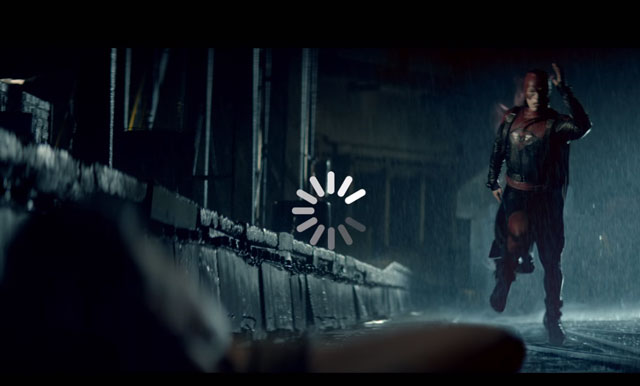
A television advertisement by MWeb that uses the term “mother-buffer” is acceptable, despite its play on an expletive, the Advertising Standards Authority (ASA) has ruled. This follows a complaint from viewers who found the ad offensive.
The ad features a generic superhero rushing to rescue a woman tied to the railway tracks, with a train fast approaching. As he rushes forward, he appears to stop in mid-air while the screen buffers, plays a little, and then buffers again, much to the dismay of the lady in distress. As this occurs, the voice-over asks: “Is slow Internet running your life?”, after which the lady exclaims: “Mother-buffer!”
The voice-over then outlines the specifics of the offer, while the superhero appears frustrated and confused at his immobility, preventing him from saving the lady tied to the tracks, the ASA said.
Complainants said the scene was unsuitable and horrific for children and the word “mother-buffer” is inappropriate and clearly an attempt to hide vulgar language and is being emulated by young children.
In response, MWeb, through its ad agency, said the ad promotes its fibre network and is meant to show that buffering on slow Internet connections can frustrate users.
“Its market research shows that slow speeds and buffering is one of the primary complaints when dealing with the Internet,” the ASA said. “The commercial references these concerns in a playful tongue-in-cheek manner.”
The company said that the use of the word “mother” could be viewed in the sense that suggests that buffering is the “mother” of all Internet-related frustration. It accepted, however, that there is room to argue that “mother-buffer” could be interpreted as a reference to another well-known expletive.
However, it said the use of the word was canvassed with ACA Advisory Services prior to the flighting of the ad, and it was found to be acceptable in this context used. “Only people familiar with the well-known expletive would understand the reference, meaning that uninformed children remain unharmed by the term ‘mother-buffer’.”
It said the ad does not depict any offensive imagery and the reference is used in a “playful and non-aggressive manner”.
It said, too, that the scene used is a stereotypical spoof scene derived from the days of silent movies, where the hero (often a cowboy) had to rescue the leading lady from the train tracks.
“This scene has been mocked and reproduced in countless movies, shows and even cartoons since then precisely because it has become cliché. The imagery and scene, however, are not likely to harm children…”
In its ruling, the ASA said that ads addressed to or likely to influence children should not contain any statement or visual presentation which might result in harming them, mentally, morally, physically or emotionally. It should not create an impression that it is acceptable to be in certain surroundings, or behave in a certain manner when doing so is not safe.
“At the outset, the directorate rejects the notion that the imagery and scenario are likely to be frightening or ‘horrific’ to children… The mood and setting relied on is no different to typical superhero cartoons and movies, and is not violent, frightening or aggressive to an extent that children are likely to be harmed as a consequence.”
Regarding the term “mother-buffer”, the ASA said it is not convinced that it would be interpreted by a hypothetical reasonable adult as anything but a tongue-in-cheek reference to the word “motherf***er”.
Watch the ad:
“However, adults are likely to be familiar with the expletive as well as the term ‘buffer’ and would therefore likely understand the pun,” it said.
“This same argument applies to the question of whether or not the word ‘mother-buffer’ is likely to harm children. It can be accepted that children who are familiar with the original expletive would understand the pun, but would equally be aware that the original expletive is not acceptable during general conversation. As such, these children would likely appreciate the humour without interpreting it as a condonation of the use of the expletive.
“This means that the only remaining question is whether or not children who do not know the original expletive are likely to discover it as a result of this commercial, and/or start using it as a consequence.”
MWeb’s flighting of the ad during typical family viewing programming means parents are likely to be readily available to explain and contextualise the message, it said.
“Given the above, and given that the commercial and product is primarily targeted at adults, the directorate does not believe that children who are unfamiliar with the original expletive would be harmed or encouraged to use this expletive as a result of the commercial.” — © 2016 NewsCentral Media




